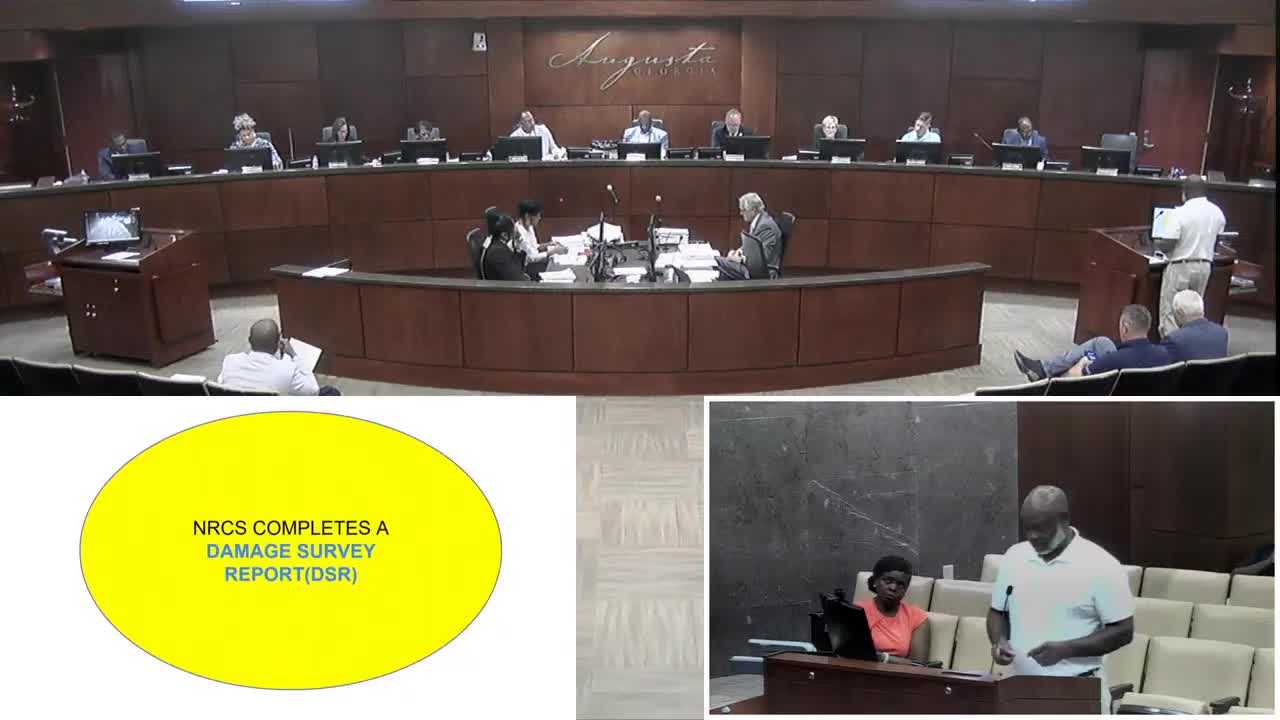NRCS outlines funding for emergency disaster recovery programs after recent natural disasters
July 31, 2025 | Augusta City, Richmond County, Georgia
This article was created by AI summarizing key points discussed. AI makes mistakes, so for full details and context, please refer to the video of the full meeting. Please report any errors so we can fix them. Report an error »

In a recent Special Called Committee Meeting in Augusta, Georgia, key discussions centered around funding for disaster recovery projects and adjustments to waste collection fees for the upcoming fiscal year. The meeting highlighted the importance of federal support for local recovery efforts and the pressing need to address waste management costs amid rising operational expenses.
A representative from the Natural Resources Conservation Service (NRCS) detailed the funding process for disaster recovery projects, emphasizing that the agency would cover 75% of project costs, with local sponsors responsible for the remaining 25%. For communities classified as Limited Resource Areas (LRA), the federal contribution could increase to 90%. This classification is based on specific criteria, including housing values and unemployment rates. The representative stressed the importance of timely requests for funding, noting that communities have a limited window to submit damage survey reports following disasters.
The discussion then shifted to waste collection fees, with the city administrator outlining the financial challenges faced by the waste management program. The current fee structure, established in 2013, has not kept pace with inflation or operational costs, leading to a projected shortfall of approximately $5.5 million if no changes are made. The administrator presented two options for fee increases: a modest increase to $4.50 per month, which would not cover ancillary costs, or a more comprehensive increase to $6.25, which would include necessary services like mosquito control and vacant lot maintenance.
Concerns were raised by committee members regarding the perceived lack of return on investment for certain services, particularly in relation to street cleaning and vacant lot management. The administrator acknowledged these concerns and emphasized the need for accountability in service delivery, assuring committee members that efforts would be made to improve transparency and responsiveness to community needs.
As the committee deliberated on the proposed fee adjustments, it became clear that a decision must be made soon to ensure timely implementation and compliance with state regulations. The administrator noted that any changes would need to be communicated to the tax commissioner by August 18 to align with the upcoming tax billing cycle.
In conclusion, the meeting underscored the dual challenges of securing federal funding for disaster recovery and addressing the financial sustainability of waste management services. As Augusta navigates these issues, the decisions made in the coming weeks will have significant implications for both community recovery efforts and the quality of services provided to residents.
A representative from the Natural Resources Conservation Service (NRCS) detailed the funding process for disaster recovery projects, emphasizing that the agency would cover 75% of project costs, with local sponsors responsible for the remaining 25%. For communities classified as Limited Resource Areas (LRA), the federal contribution could increase to 90%. This classification is based on specific criteria, including housing values and unemployment rates. The representative stressed the importance of timely requests for funding, noting that communities have a limited window to submit damage survey reports following disasters.
The discussion then shifted to waste collection fees, with the city administrator outlining the financial challenges faced by the waste management program. The current fee structure, established in 2013, has not kept pace with inflation or operational costs, leading to a projected shortfall of approximately $5.5 million if no changes are made. The administrator presented two options for fee increases: a modest increase to $4.50 per month, which would not cover ancillary costs, or a more comprehensive increase to $6.25, which would include necessary services like mosquito control and vacant lot maintenance.
Concerns were raised by committee members regarding the perceived lack of return on investment for certain services, particularly in relation to street cleaning and vacant lot management. The administrator acknowledged these concerns and emphasized the need for accountability in service delivery, assuring committee members that efforts would be made to improve transparency and responsiveness to community needs.
As the committee deliberated on the proposed fee adjustments, it became clear that a decision must be made soon to ensure timely implementation and compliance with state regulations. The administrator noted that any changes would need to be communicated to the tax commissioner by August 18 to align with the upcoming tax billing cycle.
In conclusion, the meeting underscored the dual challenges of securing federal funding for disaster recovery and addressing the financial sustainability of waste management services. As Augusta navigates these issues, the decisions made in the coming weeks will have significant implications for both community recovery efforts and the quality of services provided to residents.
View full meeting
This article is based on a recent meeting—watch the full video and explore the complete transcript for deeper insights into the discussion.
View full meeting
